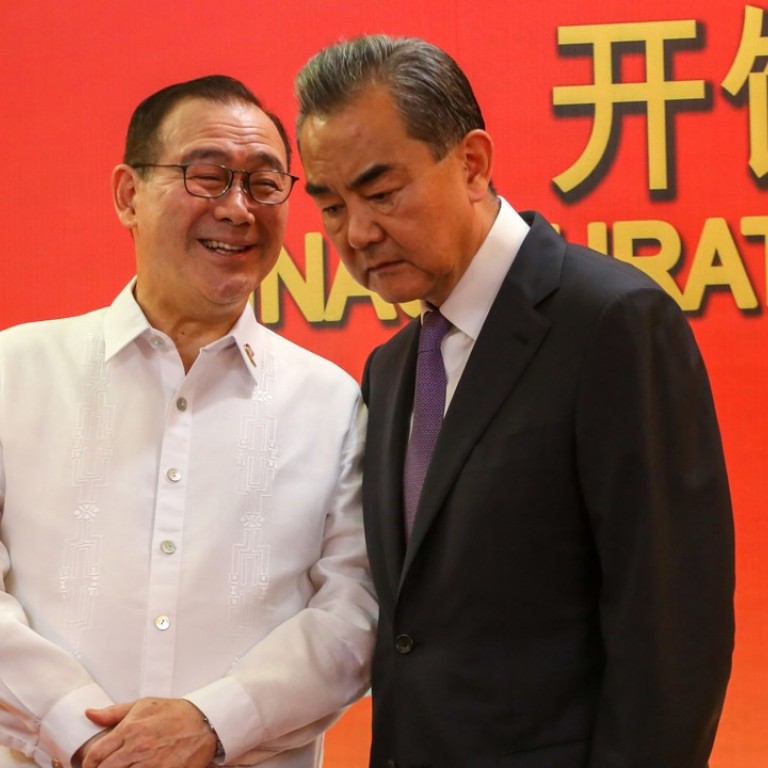
Chinese foreign minister Wang Yi warns US against ‘interference’ in South China Sea
- Wang Yi’s jibe about American naval exercises comes on visit to Philippines where Beijing pledges further support for hosts
- Visit signals growing rapprochement between rival claimants to South China Sea as Washington takes increasingly assertive stance towards Beijing’s activities
China’s foreign minister Wang Yi has warned against “external interference” in the South China Sea in a pointed rebuke to the United States.
The sharp words he reserved for Washington, which has been increasingly critical of Chinese militarisation of the contentious waters, came as Beijing pledged to expand its cooperation with Manila during a visit to the Philippines, signing deals that offered millions in humanitarian and policing aid.
Wang urged the Philippines and other members of the Association of Southeast Asian Nations (Asean) to be vigilant against “interference and disruption coming from the outside” during a joint press conference with his Filipino counterpart, the newly appointed foreign minister Teodoro Locsin.
“As China and the Philippines, and other littoral states in the South China Sea are cooperating to uphold peace and cooperation in the South China Sea, some non-regional countries are doing things completely contrary to our efforts,” he said, in a clear reference to the United States.
Are Beijing, Manila close to a deal on South China Sea exploration?
“They have been wilful in showing off their force in these waters. Regional countries need to maintain high vigilance … we will not leave any opportunity to be exploited by external forces.”
Wang’s comments come amid heightened tensions between Beijing and Washington.
The US has expressed increasing concern about Beijing’s ’s militarisation of the strategic waterway, and it has been reported that the US may conduct a naval exercise in the South China Sea during Chinese President Xi Jinping’s November visit to Manila.
Meanwhile, relations between China and the Philippines have warmed considerably in recent years – something both ministers hailed as a “turnaround” – after the 2016 ruling of an international tribunal that dismissed China’s claims to most of the South China Sea.
The two pointed to areas of further cooperation in the disputed waters, with Wang saying China is ready to discuss the joint development of oil and gas in the South China Sea “without prejudice to each other’s sovereign claims”, as well as further mechanisms for communication.
Earlier this year, China and Asean nations agreed to a draft code of conduct in the disputed waters and engaged in their first-ever joint maritime exercises.
But critics have dismissed the draft agreement as one that is not only not legally binding, but one that remains far from being finalised.
Locsin recognised that both sides would “never compromise on our respective core interests” – their “red lines” in the maritime dispute – but said that is “no reason” to stop them cooperating.
Hothead or peacemaker? Philippines’ controversial new China envoy
“Perhaps we will not be able to arrive at the legally binding code of conduct, but it will be the standard on how the people of Asean, the governments of Asean, will behave towards each other, always with honour, never with aggression, and always for the mutual progress,” he told reporters.
Wang said the two sides will also speed up consultation on the code of conduct agreement to conclude by the end of the Philippines’ three-year term as the country coordinator between China and the Asean states. The Philippines took over from Singapore in that role in August.
“China is open-minded about what specific content will be put into the text,” he said. “We welcome all constructive opinions within the framework of the single text that has been agreed upon.
“China has never been – and will never be – a rival to the Philippines, even less a threat.”
Ambassadors from the two countries also signed three agreements on Monday: a Chinese grant of US$1 million in humanitarian and disaster relief aid, 50 million yuan (US$7.2 million) in law enforcement equipment for the Philippine police and drug enforcement agency, and a feasibility agreement for a China-funded bridge project on the Davao river.
The signings come after Wang inaugurated a new Chinese consulate over the weekend in Davao City, the hometown of Philippines president Rodrigo Duterte, on his two-day goodwill trip.
Local media noted it was unusual that Wang would remain on the southern island of Mindano throughout his visit, avoiding the capital Manila entirely, and that the country’s top diplomat had personally opened the consulate.

